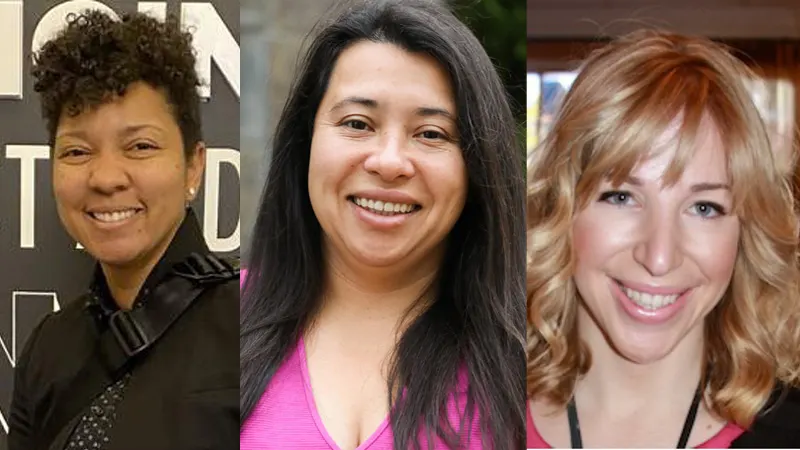“We’re here today because we want to bring the joy of horse sports to as many people as possible, and we want to work together to make that a reality.”
With those words, Hadley Zeavin set the tone for a bridge-building workshop that helped equestrians recognize biased or harmful language and gave them a range of scripts to interrupt it. The Monday night webinar, titled “Interrupting Bias and De-Escalation Techniques for Equestrians,” was an installment in the U.S. Equestrian Federation’s Diversity, Equity and Inclusivity Community Conversation series.
The panelists were Zeavin (she/her), an amateur hunter rider and the director of service learning and experiential education at La Jolla Country Day School, as well as a member of the U.S. Hunter Jumper Association Diversity and Inclusion Advocacy Committee; Dr. Caroline Prijatel-Sutton (she/her), an amateur hunter rider who serves as the executive director of The Coalition, an agency dedicated to supporting victims of family abuse; and Ashland Johnson (she/her), an attorney, athlete and founder of The Inclusion Playbook.

Panelists (from left) Ashland Johnson, Hadley Zeavin and Dr. Caroline Prijatel-Sutton led the USEF Diversity, Equity and Inclusion Community Conversation on “Interrupting Bias and De-Escalation Techniques for Equestrians.” Photos Courtesy Of USEF
The panelists led an enthusiastic discussion with an engaged online audience, who had questions about specific scenarios, thoughts on other response language and encouragement for people who wanted to learn and do more.
Much of the advice panelists had for interrupting biased language involved assessing what the observer of that language hoped to achieve.
For example, Prijatel-Sutton focused on the difference between “calling out” and “calling in” as frameworks for responding to another person’s use of biased language. Calling in is focused on reflection, not reaction, and does not have to happen in the moment.
“It’s useful when we are seeking to learn more and have a deeper conversation to find mutual understanding across difference—when we want to imagine different perspectives, possibilities or outcomes and encourage paradigm shifts,” she said.
Some examples of calling in that Prijatel-Sutton gave included, “I’m curious, what was your intent when you said that?” or “Can you explain why that bothers you?” and “I’m feeling emotional about what just happened, but I need us to talk about it later.”
ADVERTISEMENT
Calling out, on the other hand, is best for “when we need to let someone know that their words or actions are unacceptable, and we need to interrupt in order to prevent further harm,” according to Prijatel-Sutton.
While calling out can be interpreted negatively, she emphasized that it is a useful strategy when used well, especially if it allows people who might be harmed by the language to hear someone speaking up for them.
An example of this strategy in action presented itself when one webinar participant wrote, “God forbids homosexuality” in the online chat, and another participant asked if that was a good moment for a call-out. Zeavin stepped up and demonstrated how to handle these situations.
“As someone who’s queer, that is not easy to read,” she said. “It hurts me personally to see it, and more than that, I think of our queer kids who might be in the audience or others who see it and might think that’s OK to say. One of our USEF values is that we value everyone’s identities, and we want to create a welcoming space in the horse world. So when people make comments that are purely hateful and offensive, it isn’t acceptable here.”
Other language useful for calling out, Prijatel-Sutton said, includes, “I need you to stop right there,” “This is not in accordance with the values of this barn,” and “That word is so offensive, please find a different one.”
Johnson pointed out that often, any response is better than nothing at all when it comes to bystander intervention.
Zeavin wanted to be sure participants understand the difference between making assumptions about a person’s words in one instance and observing a pattern of behavior.
“Sometimes people just don’t know any better, but if you see them repeatedly saying harmful things, it’s OK to report them to SafeSport or the USEF directly,” she clarified.
ADVERTISEMENT
Johnson emphasized that telling someone their words are harmful or offensive is actually an act of caring, because they won’t go forward making the same mistakes. “It’s an act of love and part of making our community better,” she said.
Another key component of bystander intervention is safety, according to the panel.
“Always put your own safety first,” Zeavin said, emphasizing that emotional and physical safety are both important, especially for people whose identities may be targeted by offensive comments. “Don’t be afraid to walk away from a situation if it’s dangerous for you.”
That’s where allyship can come in handy, Zeavin pointed out: “Think of the people who might be the most harmed by seeing a comment online or overhearing it at a horse show—especially if those people are in minoritized populations with higher rates of suicidal ideation or mental health crises. If you’re not living and breathing that on a daily basis, it’s easier for you to put it away and stop thinking about it, but those people can’t.”
Those people would most benefit from knowing that someone else is standing up for them as a group.
“I would love to expect allies to step forward any time they see something harmful happening, and that’s what these conversations are trying to do,” she said. “I applaud the USEF for working to bring our community forward.”
The panelists ran through several scenarios having to do with reading or overhearing harmful language with a range of possible responses, from calling out to calling in to ignoring altogether.
“The important thing to do is realize what each of these responses signals,” Johnson said. Calling out is meant to interrupt a speaker in the moment, while calling in could trigger reflection and dialogue. Ignoring the situation and saying nothing signals complicity, the panelists said.






